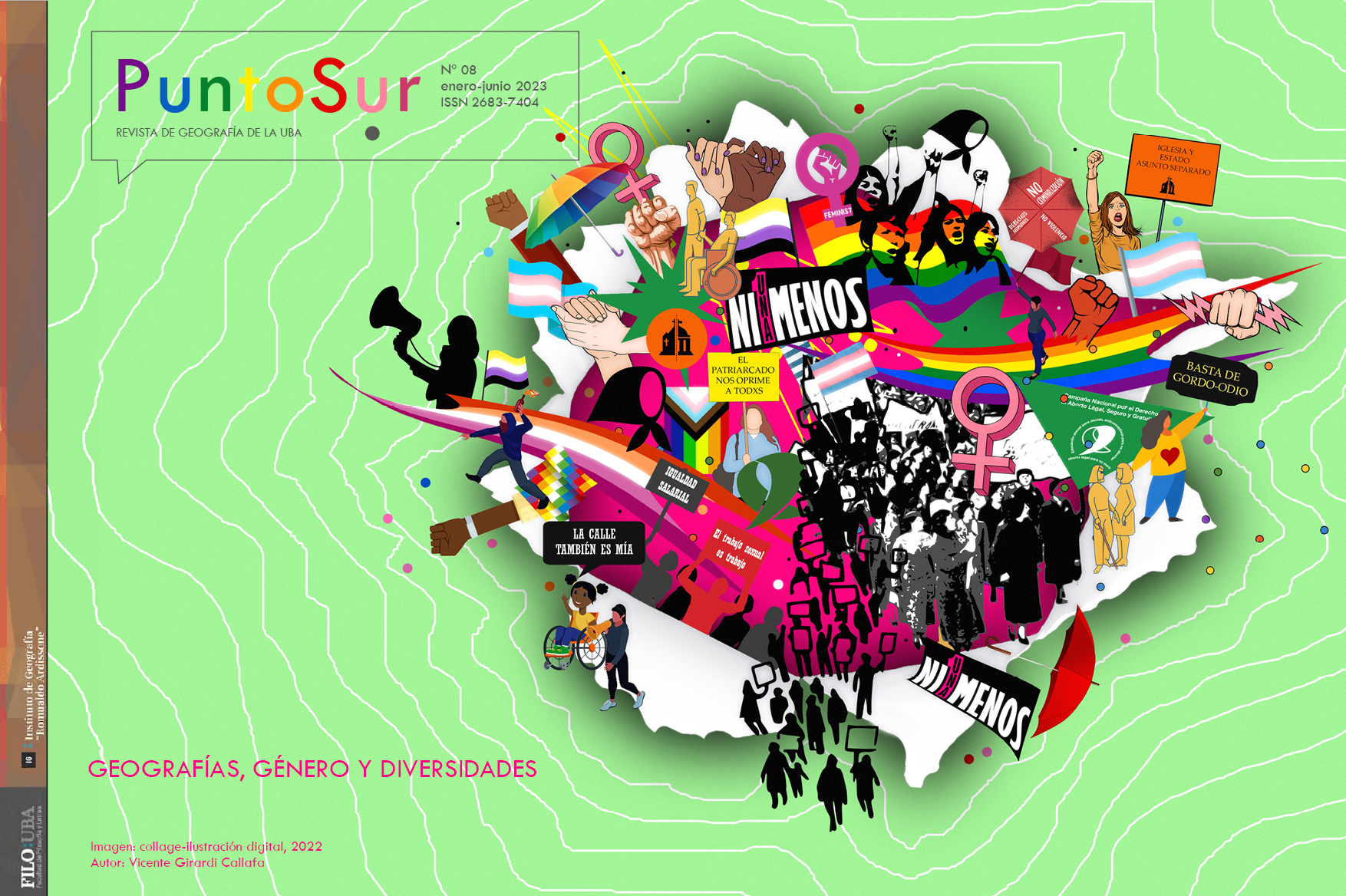O matriarcado africano na diáspora brasileira e suas contribuições para interpretação do espaço urbano
Palabras clave:
diáspora, matriarcado, espacio urbano, memoria
Resumen
Entendiendo que el proceso de colonización intensificó no solo el racismo, sino también las prácticas patriarcales como elemento estructurante de las sociedades modernas, el sentido (sentido y sentido) que la diferenciación y jerarquización de género realizada por las poblaciones europeas desencadenó en el fortalecimiento del patriarcado ejercido como dominación. Sin embargo, las diferentes formas de matriarcado existentes y practicadas en el continente africano fueron recreadas en la diáspora brasileña a través de relaciones económicas, políticas, culturales y religiosas a partir de acciones comunitarias mediadas por mujeres negras. En este sentido, el objetivo de este estudio es acercar los valores de la afrocivilización sintetizados por Azoilda Loretto da Trindade a elementos básicos del pensamiento afrocéntrico de Cheikh Anta Diop, Molefi Kete Asante, Ama Mazama y Marimba Ani y de la El matriarcado africano en la perspectiva de Ifi, Amadiume y Oyeronke Oyewumi para comprender la centralidad no homogénea de la figura femenina en el continente africano y cómo esta forma de ser, ser, actuar y pensar en el mundo aún está inscrita en los paisajes urbanos brasileños. Para ello, es necesario despojarse de preconceptos normalizados dentro de las ciencias modernas y comprender la relevancia de las diferentes formas en que las mujeres usaron, se apropiaron del espacio urbano y forjaron las ciudades a lo largo de los siglos XVIII, XIX y XX.Descargas
Citas
ABREU, Maurício de Almeida (1998). Sobre a memória das cidades. In: CARLOS, Ana Fani Alessandri; SOUZA, Marcelo Lopes de; SPOSITO, Maria Encarnação Beltrão (Orgs.). A produção do espaço urbano: agentes e processos, escalas e desafios. 1.ed., 4ª reimpressão. – São Paulo: Contexto, 2016.
AMADIUME, Ifi. Male daughters, female husbands: genderand sex in an african society. London: Zed Press, 1987.
ANI, Marimba. Yuguru: uma crítica africano-centrada no pensamento e comportamento cultural europeu. Lagos: Africa World Press, 1982.
ASANTE, Molefi Kete. Afrocentricidade: notas sobre uma posição disciplinar. In: NASCIMENTO, Elisa Larkin (org.). Afrocentricidade: uma abordagem epistemológica inovadora. São Paulo: Selo Negro, 2009. p. 93-110.
_________________. Afrocentricidade. Tradução Renato Nogueira Jr.
Professor do Instituto Multidisciplinar. Universidade Federal Rural do Rio de Janeiro. (http://www.asante.net/articles/1/afrocentricity/ acesso 12/04/2021).
CAMPOS, Andrelino de Oliveira. Do quilombo à favela: a produção do “espaço criminalizado” no Rio de Janeiro. Rio de Janeiro: Bertrand Brasil, 2005.
CIPRIANO, Nathalia Grilo. Mercado Nagôs no baixo Daomé: Mulher Negra e Empreendedorismo - Nathalia Grilo - Latinidades Pretas. (https://www.youtube.com/watch?v=ymxdjJt6hK0&t=279s acesso 10/03/2021).
DIOP, Cheikh Anta. The african origin of civilization: Mithor Reality? Westport:Lawrence Hill, 1974.
______. Civilization or barbarism: anauthentic antropology. Chicago: Lawrence Hill Books, 1991.
FARIAS, Juliana Barreto; SOARES. Mercado Minas: africanos ocidentais na Praça do Mercado do Rio de Janeiro (1830-1890).Rio de Janeiro: Prefeitura do Rio/ Casa Civil/Arquivo Geral da Cidade do Rio, 2015.
GOMES, Flávio dos Santos. Histórias de quilombos: mocambos e comunidades de senzalas no Rio de Janeiro, século XIX. Ed. Ver. e ampl. – São Paulo: Companhia das Letras, 2006.
GONZALEZ, Lélia. Primavera para as rodas negras – Lélia Gonzalez em primeira pessoa...- Coletânea organizada e editada pela UCPA – União dos Coletivos Pan-Africanistas. Diáspora Africana, 2018.
LEFEBVRE, Henri. O direito à cidade. 5. ed. Tradução de Rubens Eduardo Frias. São Paulo: Centauro Editora, 2011.
MAZAMA, A. A afrocentricidade como um paradigma. In: NASCIMENTO, E. L. (Org.). Afrocentricidade: uma abordagem epistemológica inovadora. São Paulo: Selo Negro, 2009.
MOREIRA, Carlos Eduardo et. al. Cidades negras: africanos, crioulos e espaços urbanos no Brasil escravista do século XIX. São Paulo: Alameda, 2006.
NASCIMENTO, Elisa Larkin (Org). Sankofa: resgate da cultura afro-brasileira, 2 vs. Rio de Janeiro: Ipeafro / Secretaria Extraordinária de Defesa e Promoção das Populações Afro-Brasileiras, Governo do Estado do Rio de Janeiro, 1994.
OYEWÙMÍ, Oyèrónké. Conceitualizando gênero: a fundação eurocêntrica de conceitos feministas e o desafio das epistemologias africanas. In: BERNARDINO-COSTA, Joaze; MALDONADO-TORRES, Nelson; GROSFOGUEL, Ramon (Orgs). Decolonialidade e pensamento afrodiaspórico. 1.ed.; 1 reimp. Belo Horizonte: Autêntica Editora, 2019.
PIRES, Antônio Liberac Cardoso Simões. Uma “volta ao mundo” com mulheres capoeiras: gênero e cultura negra no Brasil (1850-1920). In: XAVIER, Giovana; FARIAS, Juliana Barreto; GOMES, Flávio (Orgs.).Mulheres negras no Brasil escravista e do pós-emancipação.São Paulo: Selo Negro, 2012.
SANTOS, Milton. A natureza do espaço: técnica e tempo, razão e emoção– 4.ed 1.reimpr. – São Paulo: Editora da Universidade de São Paulo, 2004.
SODRÉ, Muniz. O terreiro e a cidade: a forma social negro-brasileira. 3.ed. – Rio de Janeiro: Mauad X, 2019.
TRINDADE, Azoilda Loretto da. Valores civilizatórios afro-brasileiros na educação infantil. Revista Valores Afro-brasileiros na Educação. S.l. S.d. Disponível em:. Acesso em 10 de fevereiro de 2021.
AMADIUME, Ifi. Male daughters, female husbands: genderand sex in an african society. London: Zed Press, 1987.
ANI, Marimba. Yuguru: uma crítica africano-centrada no pensamento e comportamento cultural europeu. Lagos: Africa World Press, 1982.
ASANTE, Molefi Kete. Afrocentricidade: notas sobre uma posição disciplinar. In: NASCIMENTO, Elisa Larkin (org.). Afrocentricidade: uma abordagem epistemológica inovadora. São Paulo: Selo Negro, 2009. p. 93-110.
_________________. Afrocentricidade. Tradução Renato Nogueira Jr.
Professor do Instituto Multidisciplinar. Universidade Federal Rural do Rio de Janeiro. (http://www.asante.net/articles/1/afrocentricity/ acesso 12/04/2021).
CAMPOS, Andrelino de Oliveira. Do quilombo à favela: a produção do “espaço criminalizado” no Rio de Janeiro. Rio de Janeiro: Bertrand Brasil, 2005.
CIPRIANO, Nathalia Grilo. Mercado Nagôs no baixo Daomé: Mulher Negra e Empreendedorismo - Nathalia Grilo - Latinidades Pretas. (https://www.youtube.com/watch?v=ymxdjJt6hK0&t=279s acesso 10/03/2021).
DIOP, Cheikh Anta. The african origin of civilization: Mithor Reality? Westport:Lawrence Hill, 1974.
______. Civilization or barbarism: anauthentic antropology. Chicago: Lawrence Hill Books, 1991.
FARIAS, Juliana Barreto; SOARES. Mercado Minas: africanos ocidentais na Praça do Mercado do Rio de Janeiro (1830-1890).Rio de Janeiro: Prefeitura do Rio/ Casa Civil/Arquivo Geral da Cidade do Rio, 2015.
GOMES, Flávio dos Santos. Histórias de quilombos: mocambos e comunidades de senzalas no Rio de Janeiro, século XIX. Ed. Ver. e ampl. – São Paulo: Companhia das Letras, 2006.
GONZALEZ, Lélia. Primavera para as rodas negras – Lélia Gonzalez em primeira pessoa...- Coletânea organizada e editada pela UCPA – União dos Coletivos Pan-Africanistas. Diáspora Africana, 2018.
LEFEBVRE, Henri. O direito à cidade. 5. ed. Tradução de Rubens Eduardo Frias. São Paulo: Centauro Editora, 2011.
MAZAMA, A. A afrocentricidade como um paradigma. In: NASCIMENTO, E. L. (Org.). Afrocentricidade: uma abordagem epistemológica inovadora. São Paulo: Selo Negro, 2009.
MOREIRA, Carlos Eduardo et. al. Cidades negras: africanos, crioulos e espaços urbanos no Brasil escravista do século XIX. São Paulo: Alameda, 2006.
NASCIMENTO, Elisa Larkin (Org). Sankofa: resgate da cultura afro-brasileira, 2 vs. Rio de Janeiro: Ipeafro / Secretaria Extraordinária de Defesa e Promoção das Populações Afro-Brasileiras, Governo do Estado do Rio de Janeiro, 1994.
OYEWÙMÍ, Oyèrónké. Conceitualizando gênero: a fundação eurocêntrica de conceitos feministas e o desafio das epistemologias africanas. In: BERNARDINO-COSTA, Joaze; MALDONADO-TORRES, Nelson; GROSFOGUEL, Ramon (Orgs). Decolonialidade e pensamento afrodiaspórico. 1.ed.; 1 reimp. Belo Horizonte: Autêntica Editora, 2019.
PIRES, Antônio Liberac Cardoso Simões. Uma “volta ao mundo” com mulheres capoeiras: gênero e cultura negra no Brasil (1850-1920). In: XAVIER, Giovana; FARIAS, Juliana Barreto; GOMES, Flávio (Orgs.).Mulheres negras no Brasil escravista e do pós-emancipação.São Paulo: Selo Negro, 2012.
SANTOS, Milton. A natureza do espaço: técnica e tempo, razão e emoção– 4.ed 1.reimpr. – São Paulo: Editora da Universidade de São Paulo, 2004.
SODRÉ, Muniz. O terreiro e a cidade: a forma social negro-brasileira. 3.ed. – Rio de Janeiro: Mauad X, 2019.
TRINDADE, Azoilda Loretto da. Valores civilizatórios afro-brasileiros na educação infantil. Revista Valores Afro-brasileiros na Educação. S.l. S.d. Disponível em:
Publicado
2023-06-30
Cómo citar
Antunes Ferreira, S. (2023). O matriarcado africano na diáspora brasileira e suas contribuições para interpretação do espaço urbano. Punto Sur, (8), 102-113. https://doi.org/10.34096/ps.n8.11626
Sección
Dossier






















